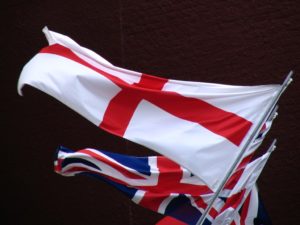HOPE not hate uses cookies to collect information and give you a more personalised experience on our site. You can find more information in our privacy policy. To agree to this, please click accept.
By Qari Asim, MBE
The result of the semi-final was disappointing, but football has already “come home”. England’s team can hold its head high because we are all proud of Southgate’s diverse young team.
Young Muslims sporting England shirts, Muslims waving the British flag on their cars, some mosques flying the flag and screening the matches, religious services being re-scheduled during weddings to suit match times signal that Englishness is an identity we all share. Raising the flag for football in the last month has sent a strong message that the flag does not belong to hooligans or to the far-right – but to all of us.
The World Cup is a reminder that sport is a language that anybody can understand. It transcends class, ethnicity and culture, and can act as a tool for peace-building in conflict areas or for integration in communities here in the UK. During the matches, it didn’t matter what colour your skin was, or which country your mum and dad came from – all that mattered in households all over the country was whether England was going to score.
The question of whether you could be black (or brown) and British was answered a long time ago. Englishness has often been seen as more difficult, partly because we seldom talk about what it means except, as now, during sports events. While we have come a long way on attitudes towards race, difficulties have been heightened since the hateful terrorist atrocities of 7/7 and more recently for Muslims. Fear and suspicion have led to less contact and understanding, meaning some people question when a Muslim says, “It’s coming home!”
A poll for British Future found that three quarters of the public – including Muslims – feel that our football team is a symbol of England that belongs to people of every race and ethnic background in the country today. It’s worth noting that the same survey found only 11% of people feel that the flag is a ‘symbol of aggressive nationalism’. The majority of the public, of ethnic minorities and of Muslims too, agree that it’s a symbol that belongs to us all. We are not squeamish about showing support for our national team – we can all fly the flag from our homes and our cars, our shops and our cafes, across the nation.
From Yorkshire, home of six of the squad, to Tottenham, where five of them play, these working-class lads of diverse ethnic backgrounds have not only rekindled love for football but also inspired many young Muslims from lower-income backgrounds to connect with English identity.

Despite their very English passion for the game, Muslim and Asian players have yet to break into English football at the elite level, and that’s a real shame. It may just be a matter of time – Wolverhampton Wanderers’ Danny Baath, of mixed English and Punjabi heritage, did captain his side to promotion to the Premiership this season. Mo Salah has shown the world that faith and football can go together, and with investment and efforts to get Asians into football on the up, a time will come where we have more people like him on the pitch. Today’s team already looks a lot more like modern England than teams’ past.
This World Cup has showcased what so many of us already know and love about England: we are an incredibly diverse, vibrant and accepting culture and we all stand behind our country. This shared identity and rediscovered voice is more important than ever. We haven’t been united in this way in years, so let’s build on this by building infrastructures to share our “Englishness”.
In an England riven by Brexit, it falls upon all of us to ensure that the inclusive English identity that has emerged is not lost after the World Cup.
Football has come home, and it is a home that we all share.